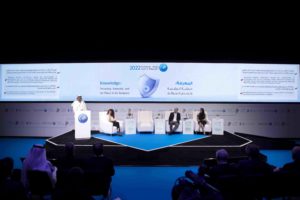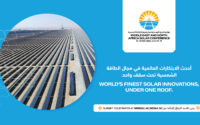Knowledge Summit Discusses Prospects, Climate Accountability, Disaster Management, And Entrepreneurship
The seventh session of the knowledge summit held its first successful day at the EXPO 2020 Dubai. The event saw the organization of six discussions at the Main Hall. The topics included, ‘Web Education 3.0 – The Metaversity’, ‘The Role & Impact of Media During Crisis: COVID-19’,‘Young Entrepreneurship’,‘Scaling up resilience in times of uncertainty’,‘Think Like a Futurist’, and ‘Pandemics and Their Impact on Climate: A Double-Edged Sword.’
Web Education 3.0 – The Metaversity
In the first session, Professor Shafi Ahmed, a surgeon, professor, inventor, and entrepreneur, discussed the contributions that the third generation of web education could make towards advancing the virtual learning system, reshaping the future of education, and aiding the development of a new system of learning. Shafi also discussed the capacity of the ‘Metaverse’ to build and develop new ecosystems in the education and health sectors. He further pointed out that humanity is entering a rapidly advancing world with implications for all sectors including education, which is the backbone of knowledge.
Shafifurtherexplained how innovative technology will contribute significantly to changes in the education and health-care sectors, from patient visits to surgeries, by utilizing metaverse techniques. He emphasized that the world must collaborate to promote progress in the virtual world and its multiple dimensions, like the Internet of Things (IoT,) artificial intelligence (AI,) Web 3.0, and 5G, to help achieve better success.
The Role & Impact of Media During Crisis: COVID-19
The second session of the Knowledge Summit discussed the role and impact of the media during crises, the spread of misinformation that occurs especially through social media, and the role it plays in exacerbating the Covid-19 crisis by spreading rumors and fake news.
Speakers at the session included H.E. Karam Gabr, Head of the Supreme Council for Media Regulation in Egypt, Ali Jaber, Director of MBC Group, Ali Obaid Al Hamli, News Centre Department Director at Dubai Media, and Michael Peters, Chairman of the Board of Directors at Euronews. The session was moderated by TV Presenter LojainOmran.
Young Entrepreneurship
Directed towards the younger generation, the third session of the Knowledge Summit discussed the best time for Gen Z to explore entrepreneurial opportunities, how they could take advantage of the abundance of knowledge available across the new media landscape, and the importance of making an impact.
The session featured Jenk OZ, the 16-year-old entrepreneur, founder, and CEO of Thred Media, who shared valuable insights regarding his entrepreneurial experience. Launched in 2013,Thred Media and is a multi-award-winning media and publishing company. The enterprise focuses on creating a community of dedicated people who support each other and work together to bring about positive change.
OZ emphasized that there is no exact time for an individual to start his company. He further stated that the success of a company depended on the team and its ability to work as one. Talking about company growth and development, OZ stressed the importance of continuous production, and consistent creative innovation.
Scaling up resilience in times of uncertainty
In light of the pandemic and various other global issues, the fourth session of the Summit discussed strategies to increase resilience and flexibility in times of uncertainty.The speakers included dignitaries like Khaled Abdel Shafi, Director of the UNDP Regional Hub for the Arab States, Sujit Kumar Mohanty, Chief of United Nations Office for Disaster Risk Reduction (UNDRR), Regional Office for Arab States, and Dr. Mona Mostafa El-Sholkamy, assistant professor at the Mohammed Bin Rashid School of Government. The session was moderated by Matthew Burnard, Director at Control Risks.
Khaled Abdel Shafi highlighted the need to imbibe a culture of resilience, adaptability, and flexibility during times of uncertainty. He also pointed to the driving role that these features play in achieving the Sustainable Development Goals (SDGs)formulated by the UN, especially the 17th goal of building and strengthening global partnerships. Abdel Shafi also spoke about how the Pandemic exposed the fragility of the health and economic sectors and emphasized the need to find more robust solutions. Exploring the prevailing global digital divide and the significant disconnect that has occurred as a result,he stressed the need for Arab regions to take immediate action to address this shortcoming.“Today, the world is called upon to empower, because pandemics may come back again, and Covid-19 may not be the last. The world must be adequately prepared to adapt in a way that can withstand any future crises,” Abdel Shafi added.
Touching upon the devastating impact of disasters, Sujit Mohanty spoke about the difficulties that arise while trying to cope with their consequences. He also added that the responsibility to manage these disasters lay with the governments and stressed the importance of rethinking strategies in a way that would equip communities with the necessary knowledge for recuperation.
Adding to this, Mona El-Sholkamy discussed how public policy can aid disaster management. She explained how the crises that the world has undergone over the last few years have given rise to innovative methods that may significantly reduce disaster impact and further established that the world must draw lessons from states that have successfully handled disasters and crises.
Think Like a Futurist
Looking forward with hope, the fifth session of the Knowledge Summit saw Matthew Griffin, an award-winning futurist who discussed how to shape future preparedness for pandemics. He said, “The world is changing in an accelerated manner thanks to electronic chips and artificial intelligence.All these technological advancements will bring forth a dramatic change in the coming years.For example,previous pandemics had taken scientists at least five years to find a vaccine, but the Covid-19 vaccine barely took three months.Considering this progress, it is safe to assume that in the event of future pandemics between 2025 and 2030, it would take almost no time to develop a vaccine.”
Griffin also acknowledged the difficulty to look ahead. He also shared the idea of the forward-thinking process, as one that is seen through a three-sided triangle- what’s the problem? what’s the technique? and what’s the impact on society?
He then discussed the massive potential that the future holds, citing scientist’s findings that were directed towards solving global issues like hunger and global warming. However, he also established that this would require policy support through new laws and regulations that would allow for the proper execution of these advancements.
He said, “Nothing is impossible. This world contains knowledge that can help shape the future through innovations like industrial biology, genetic engineering, and quantum computers, but there needs to be clarity regarding global goals and problems in order to accomplish them, and this needs perseverance.”
Pandemics and Their Impact on Climate: A Double-Edged Sword
The final session of the Knowledge Summit provided a balanced view of the COVID-19 pandemic on the climate and environment, citing positive and negative implications, while also glossing over the lessons learnt to mitigate the effects of climate change.
The panel consisted of Katherine Bruce, Sustainability & Climate Change lead for WSP’s Middle East team and Ibrahim N. Al-Zu’bi, Chief Sustainability Officer, Majid Al Futtaim. It was moderated by Brandi Scott, Co-host of The Business Breakfast, Dubai Eye.
Katherine Bruce reminded listeners of the positive impacts of the pandemic on the environment and climate, due to the closures and restrictions that were in place. She noted that the severe travel restrictions and bans on social and commercial activities had led to a reduction in air pollution levels. However, she also said that the increased dependence on plastic, has produced more problems in waste management and plastic degradation. This has resulted in significant negative impact on the ecosystem.
Emphasizing climate change as one of the most important global environmental issues, Ibrahim Al-Zu’bi referred to it as a direct threat to the future of the planet and humanity. He also raised his concerns regarding the increased use of plastic within the health sector and the resulting medical waste. He further took the opportunity to share how the Sustainability Team at Majid Al Futtaim Holdings was able to successfully cope with the challenges presented by the pandemic by ensuring continuous supply by developing forecasts and solutions based on periodically defined data and statistics.









